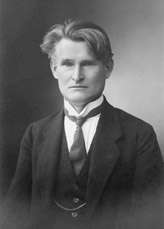Kazys Grinius
| Kazys Grinius | |
|---|---|
 | |
| Third President of Lithuania | |
|
In office 7 June 1926 – 17 December 1926 | |
| Preceded by | Aleksandras Stulginskis |
| Succeeded by | Jonas Staugaitis (Acting) |
| Personal details | |
| Born |
17 December 1866 Selema, Augustów Governorate, Russian Empire |
| Died |
4 June 1950 (aged 83) Chicago, Illinois, United States |
| Political party | Lithuanian Popular Peasants' Union |
| Spouse(s) | 1st: Joana Pavalkytė-Griniuvienė, 2nd: Kristina Arsaitė-Grinienė |
| Children | Liūtas (Leo) Grinius (died 1989) |
Kazys Grinius ([kɐˈz̪ʲiːs̪ ˈɡʲrʲɪn̪ʲʊs̪], 17 December 1866 – 4 June 1950) was the third President of Lithuania, and held that office from 7 June 1926 to 17 December 1926.[1]
Grinius was born in Selema, near Marijampolė, in the Augustów Governorate of Congress Poland, a part of the Russian Empire (present-day Lithuania). He studied medicine at the University of Moscow and became a physician. As a young man, he became involved in Lithuanian political activities, and was persecuted by the Tsarist authorities. In 1896 he was one of the founders of the Social Democratic Party of Lithuania (LSDP).
That same year he married Joana Pavalkytė. For some time they lived in Virbalis. In 1899, their son Kazys was born, and in 1902, their daughter Gražina was born. During World War I they lived in Kislovodsk. In 1918 during a Red Army attack his wife and daughter were killed. They were buried in Kislovodsk cemetery.
When Lithuania regained its independence in 1918, Grinius became a member of the National Assembly as a member of the Peasant Populist Party. He served as Prime Minister from 1920 until 1922, and signed a treaty with the Soviet Union. He was elected President by the Third Seimas, but served for only six months, as he was deposed in a coup led by Antanas Smetona, under the pretext that there was an imminent communist plot to take over Lithuania. (Smetona took the Presidency after two others held the office for less than a day each.)
When Nazi Germany invaded Lithuania in 1941, Grinius refused to collaborate with the Germans because of his opposition to the occupation of Lithuania by any foreign power. He fled to the West, when the Soviet army reoccupied Lithuania in 1944, and emigrated to the United States in 1947.[1]
He died in Chicago, Illinois, in 1950.[1] After Lithuania regained its independence in 1990, his remains were returned and buried there.
See also
References
- 1 2 3 "Kazys Grinius". Encyclopædia Britannica. Retrieved 2009-10-17.
External links
| Preceded by Ernestas Galvanauskas |
Prime Minister of Lithuania 19 June 1920 – 2 February 1922 |
Succeeded by Ernestas Galvanauskas |
| Preceded by Aleksandras Stulginskis |
President of Lithuania 7 June 1926 – 17 December 1926 |
Succeeded by Jonas Staugaitis |